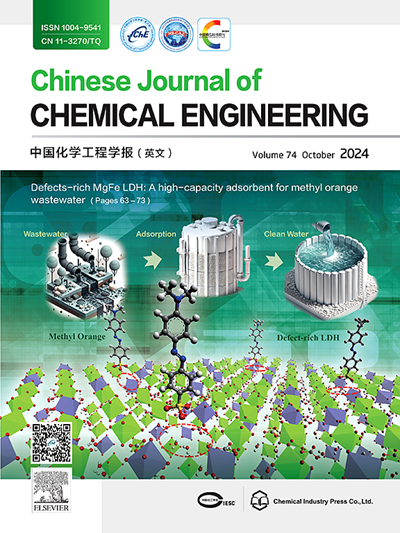采用Pd/g-C3N4配置液滴反应器,在水条件下进行Suzuki-Miyaura交叉偶联反应
IF 3.7
3区 工程技术
Q2 ENGINEERING, CHEMICAL
引用次数: 0
摘要
pd催化的Suzuki-Miyaura偶联反应是构建C−C键的重要工具。目前,反应过程中使用的有机溶剂可能会造成严重的环境问题。此外,无机碱在有机溶剂中的低溶解度导致了巨大的传质阻力。为了解决这一问题,报道了Pd/g-C3N4在基质-水两相界面稳定的Pickering液滴反应器。得益于疏水共轭框架和亲水末端基团,Pd/g-C3N4无需额外官能化即可配置稳定的皮克林乳液。负载Pd的催化剂在Suzuki-Miyaura偶联反应中表现出优异的TOF (21852 h−1),这源于g-C3N4独特的电子结构和高的乳化界面面积。此外,6次循环后反应性没有明显下降(转化率>;86%)。在本研究中,有机溶剂被反应底物取代,对各种卤代芳烃及其衍生物都能获得高活性。本文章由计算机程序翻译,如有差异,请以英文原文为准。

Configured droplet reactor by Pd/g-C3N4 for the Suzuki-Miyaura cross-coupling reaction under water condition
The Pd-catalyzed Suzuki-Miyaura coupling reaction is a crucial tool for constructing C−C bonds. Currently, the organic solvents employed during reaction may cause serious environmental problems. Moreover, the low solubility of inorganic bases in organic solvents leads to enormous mass transfer resistance. To address this issue, the Pickering droplets reactor stabilized by Pd/g-C3N4 at substrate-water two-phase interface is reported. Benefiting from the hydrophobic conjugated framework and hydrophilic terminal groups, Pd/g-C3N4 can configure stable Pickering emulsion without additional functionalization. The Pd loaded catalysts exhibits excellent performance (TOF = 21852 h−1) for the Suzuki-Miyaura coupling reaction, which is deriving from unique electronic structure of g-C3N4 and high interfacial area of emulsion. Moreover, there is no clear decrease in reactivity after six cycles (conversion >86%). In this study, the organic solvent was replaced by reaction substrate, and the high activity can be achieved for various halogenated aromatic hydrocarbons and their derivatives.
求助全文
通过发布文献求助,成功后即可免费获取论文全文。
去求助
来源期刊

Chinese Journal of Chemical Engineering
工程技术-工程:化工
CiteScore
6.60
自引率
5.30%
发文量
4309
审稿时长
31 days
期刊介绍:
The Chinese Journal of Chemical Engineering (Monthly, started in 1982) is the official journal of the Chemical Industry and Engineering Society of China and published by the Chemical Industry Press Co. Ltd. The aim of the journal is to develop the international exchange of scientific and technical information in the field of chemical engineering. It publishes original research papers that cover the major advancements and achievements in chemical engineering in China as well as some articles from overseas contributors.
The topics of journal include chemical engineering, chemical technology, biochemical engineering, energy and environmental engineering and other relevant fields. Papers are published on the basis of their relevance to theoretical research, practical application or potential uses in the industry as Research Papers, Communications, Reviews and Perspectives. Prominent domestic and overseas chemical experts and scholars have been invited to form an International Advisory Board and the Editorial Committee. It enjoys recognition among Chinese academia and industry as a reliable source of information of what is going on in chemical engineering research, both domestic and abroad.
 求助内容:
求助内容: 应助结果提醒方式:
应助结果提醒方式:


